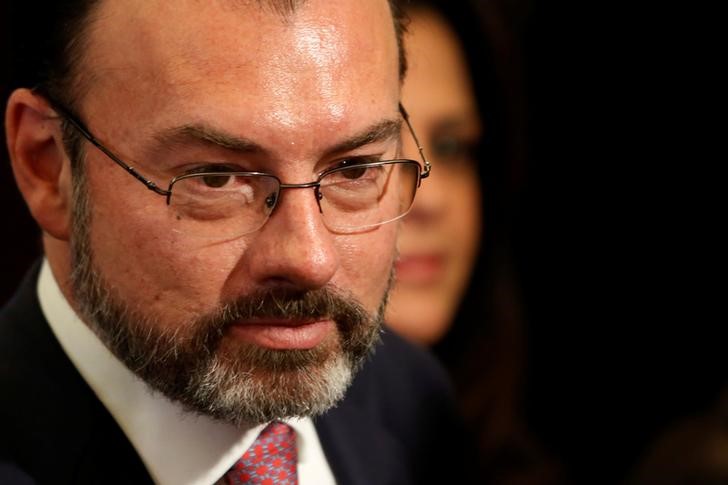(Adds comments from foreign minister)
MEXICO CITY, Feb 28 (Reuters) - A defiant Mexico said on Tuesday it would only stay in NAFTA if it suited it and rejected the imposition of any tariffs or quotas when renegotiating the trade deal U.S President Donald Trump wants to recast to benefit the United States.
Trump has vowed to exit the North American Free Trade Agreement, the 1994 accord which also includes Canada, if he cannot get better terms. For its part, Mexico would not accept changes that restricted free trade, Foreign Minister Luis Videgaray said at a session of Mexico's Senate.
"We will remain if it suits Mexico," Videgaray said. "(NAFTA) is not an act of faith, or a dogmatic position, it is an instrument to generate jobs."
He was speaking days after a visit to Mexico by U.S. Secretary of State Rex Tillerson and Homeland Security Secretary John Kelly in which Mexican officials hardened their position against trade and immigration policies under Trump. Republican president has angered Mexicans with calls for U.S. firms not to invest south of the border, hard line immigration policies and plans to make Mexico finance a border wall. spoke positively about a 20 percent border tax on imports being pushed by Republicans in Congress during a Reuters interview last week. He had previously sent mixed signals about the proposal.
Mexico has expressed confidence Trump will not be able to impose harsh barriers on imports anytime soon and vowed to retaliate if the United States imposed a border tax. who is leading Mexico's diplomacy with Trump, said trade talks would begin in June or later and would not be quick.
"The executive branch, via the economy ministry, will not accept any modification that implies damage or doesn't benefit the national economy," he said.
The country also shouldn't turn its back on China or the possibility of strengthening that relationship, he said.
DEPORTEES' SAVINGS
One point of tension between the two countries has been the treatment of undocumented Mexican immigrants in the United States. Videgaray said he had asked the United Nations and the Organization of American States to be on a state of alert on the issue.
Videgaray said he had emphasized to Tillerson and Kelly last week the importance of a "Totalization Agreement" - signed in 2004 but never ratified - that he said allowed Mexican deportees to access social security payments and savings made while in the United States
